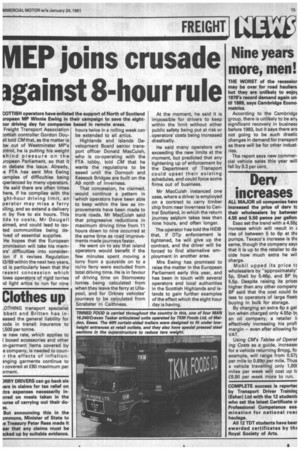MEP joins crusade 3gainst 8-hour rule
Page 17

If you've noticed an error in this article please click here to report it so we can fix it.
COTTISH operators have enlisted the support of North of Scotland uropean MP Winnie Ewing in their campaign to save the eight)ur driving day for companies based in remote areas.
Freight Transport Association :lottish controller Gordon Douai' told CMthat, as the matter is pw out of Westminster MP's mtrol, he is putting his weight ehind pressure on the aropean Parliament, so that it in debate the issue. Already, le FTA has sent Mrs Ewing camples of difficulties being cperienced by many operators. He said there are often times here, if he complies with the ght-hour driving limit, an perator may miss a ferry iiling, and so extend a delivery in by five to six hours. This ids to costs, Mr Dougall aimed, and could lead to isoted communities being delved of essential supplies.
He hopes that the European Drn m ssio n will take his mem3rs' difficulties into considerion if it revises Regulation 13/69 within the next two years, Id is particularly keen that the resent concession which lows operators of rigid lorries id light artics to run for nine
hours twice in a rolling week can be extended to all attics.
Highlands and Islands Development Board senior transport officer Donald MacCuish, who is co-operating with the ETA lobby, told CM that he wants the regulations to be eased until the Domoch and Kessock Bridges are built on the A9 north of Inverness.
That concession, he claimed, would continue a pattern in which operators have been able to keep within the law as improvements have been made to trunk roads. Mr MacCuish said that progressive reductions in maximum driving time from 11 hours down to nine occurred at the same time as road improvements made journeys faster.
He went on to say that island operators would benefit if the few minutes spent moving a lorry from a quayside on to a ro/ro ferry were excluded from total driving time. He is in favour of driving time on Stornoway lorries being calculated from when they leave the ferry at Ullapool, and for Orkney vehicles' journeys to be calculated from Scrabster in Caithness. At the moment, he said it is impossible for drivers to keep within the limit without either public safety being put at risk or , operators' costs being increased drastically.
He said many operators are exceeding the new limits at the moment, but predicted that any' tightening up of enforcement by • the Department of Transport could upset their existing schedules, and could force some firms out of business.
Mr MacCuish instanced one case, where a driver is employed on a contract to carry timber chip from near Inverness to Central Scotland, in which the return journey selgiom takes less than nine hours, and often longer.
The operator has told the HIDB that, if DTp enforcement is tightened, he will give up the contract, and the driver will be forced to find alternative employment in another area.
Mrs Ewing has promised to raise the matter in the European Parliament early this year, and has been in touch with several operators and local authorities in the Scottish Highlands and islands to gain further examples of the effect which the eight hour day is having.








































































































